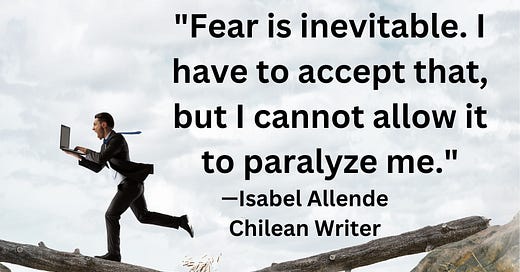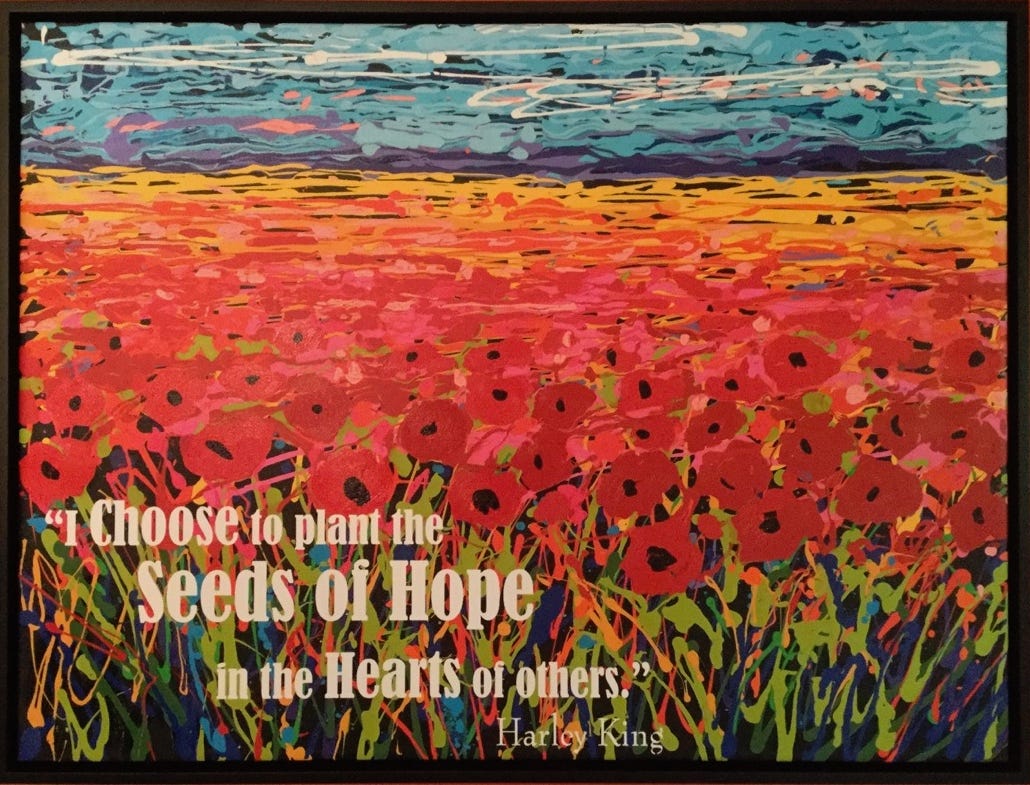Issue #31
The person who says that he has no fear is a liar. We all fear something. Maybe we are afraid that we are not good enough, that we have no talent, and that we have wasted our time writing, painting, or acting. What do you fear? What keeps you awake at night? How do you cope with your fears? Do you run and hide? Do you confront your fears head-on?
My biggest fear is not having enough money to pay my bills. I need to know where my next paycheck is coming from. This fear is also why I never became a full-time writer. I need financial stability, so I write part-time.
I am a risk-taker in my mind. I will question any idea or concept. Nothing is sacred. Everything is fair game. I believe the reason for this is that in my teenage years, I rejected the faith of my forefathers. If I could challenge God, then I could challenge anything. I am not a risk-taker in living my life. I have learned that I need security in the physical world so I can take risks in my mind.
But I have also faced fear and beat him at his own game. I once was afraid of speaking in public, but after 5,000 presentations, I rarely experienced the fear of speaking. In fact, I have become so relaxed that I am willing to make mistakes and laugh at myself.
What fears have you overcome? What fears are holding you back? What fears prevent you from being the leader, writer, or painter you want to be?
Many years ago, I read these words in In Search of An Identity, the autobiography of Anwar el Sadat, President of Egypt from 1970 to 1981. Since then, I have been sharing his words with my audiences in my motivational speeches on leadership.
Fear is a powerful tool for destroying the soul of an individual and the spirit of a creative artist. Rulers have used it for centuries, and so have some parents. "You better behave, or the bogeyman will get you."
Ask yourself what you are afraid of. What fears control your actions? What fears are holding you back? Are you afraid of snakes? Heights? Success? Math? A blank piece of paper? Silence? A blank canvas? The neighbor's dog? Angry customers?
In 1972, I traveled through the western United States and decided to visit a mentor from my childhood who was living in British Columbia, Canada. Ernie was a lumberjack turned minister and missionary. He had been the camp director of a Bible camp I attended every summer from the age of ten until high school. He was physically a very strong man. He could grab a pole with both hands and raise his legs in the air until they were parallel to the floor, much like a flag.
I spent a couple of weeks with him in the Canadian Rockies. He took a group of us on a two-day canoe ride on a large lake. I saw from a distance a grizzly bear fishing for salmon. On our way home, we encountered fog and lost our way. After going in a circle a couple of times, Ernie stopped the canoes and asked us to bow our heads in prayer. Despite his strength, Ernie knew he could not let fear conquer him, so he turned to God, the one source of strength he knew.
Creative leaders must learn to shake off the chains of fear. Fear can prevent us from taking risks, trying new ideas, and exploring new ways of thinking. Each of us must find the courage to do what we desire to do despite our fears.
Fear is a powerful force that affects the lives of most creative leaders. Some people are afraid to leave their houses. Some people like me are afraid of heights. Others are afraid of elevators. This list could go on and on. A person who claims that he is not afraid of anything is either delusional or a liar. We are all afraid of something.
It takes courage to look fear in the face and still take action. If you give into fear, you will freeze on the spot and not move.
Study your fears, for they have much to teach you. Some fears protect us from danger, and others predict the future. Some fears are false, and worrying about them keeps us from enjoying life. Other fears are meaningless and should be discarded.
I read a story about a man who, in the middle of a violent storm, went out of his house to move his car because he feared a tree would fall on it. While he was sitting in the car, the tree fell on the car and killed him. Sometimes, our fears predict the future. And in this case, his fear helped create the future.
I learned this early in my marriage. My wife is very good at sensing danger in the future. Where we lived, we had to drive 25 miles to a movie theater. About ten miles into the drive, she sensed something was wrong, so we turned around and went home. Now, I can never prove that something would have happened, but in my heart, I know we made the right decision.
One of those fears that we should discard is the fear of rejection. Many people face rejection, and it can hurt them emotionally. Have you ever applied and interviewed for a job only to be rejected? Have you ever had an idea only to have your boss shoot it down as unreasonable?
As a teenager, I was afraid to ask a girl on a date because I did not want to experience rejection. Many of us fear that our friends and family will reject us; sometimes, this fear is valid. Some people are rejected by their parents because they do not behave in the manner their parents want.
When I was a sophomore in high school, I made a commitment to become a minister. Because of this commitment, my parents were willing to sacrifice and send me to college. By my freshman year of college, I had decided that I no longer wanted to be a preacher but was afraid to tell my parents. Fortunately, I had the courage to tell them. While my mother cried, my parents did not reject me and remained supportive. Some people are not as lucky.
Artists, writers, and actors face rejection on a regular basis. Others sit in judgment of their work. As a writer, I have had editors reject my creative work. I learned a valuable lesson one day. By accident, I had sent my haiku to two different publishers. I received the editors’ responses on the same day. One editor rejected my work and was not interested in publishing it. The other editor accepted my work and published it. I learned that rejection does not mean the end of the world. Someone somewhere will be interested in my work.
And sometimes, our fear of rejection keeps us from sharing ourselves with the world. Rejection by others can not harm us unless we let it. You know yourself better than anyone does. Don't let people's prejudices and ignorance stand in the way of what you desire.
Action Steps
Here are four actions you can take to help you better understand your fears and help you overcome them.
Identify the fears that are holding you back from the success you desire.
Examine your fears and explore why you are afraid. This can be difficult and take a considerable amount of time. Whenever you feel afraid, ask yourself, “Why am I afraid?”
Write a few paragraphs about your fears. Start with a phrase like I am afraid of __________ because ______________. Keep writing for as long as you can. Don’t worry about grammar or spelling. These paragraphs are for your eyes only. Do not show the writing to anyone.
Ask different people if they would be willing to share a story about a fear they had and how they overcame the fear. Identify any lessons you can learn from their stories.







